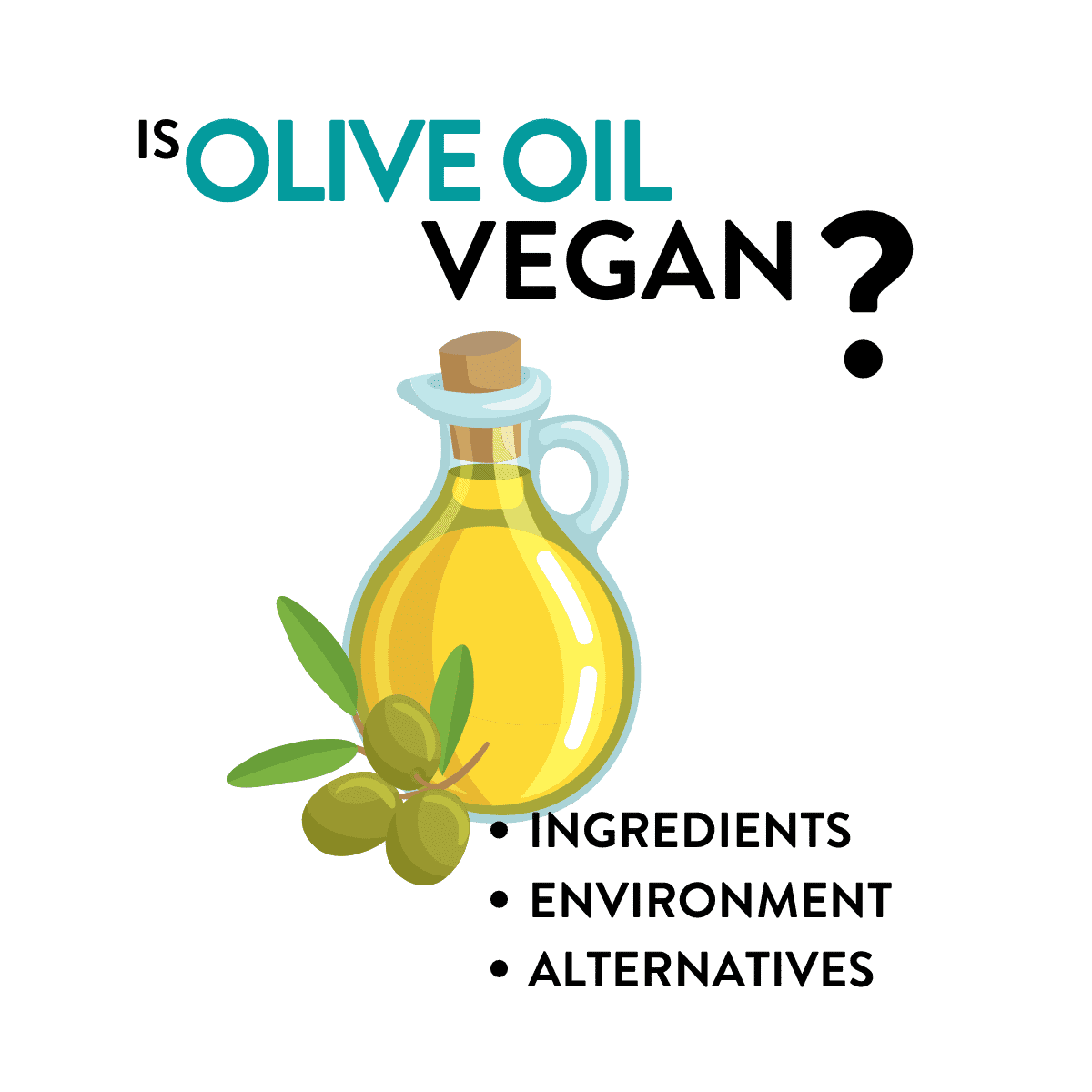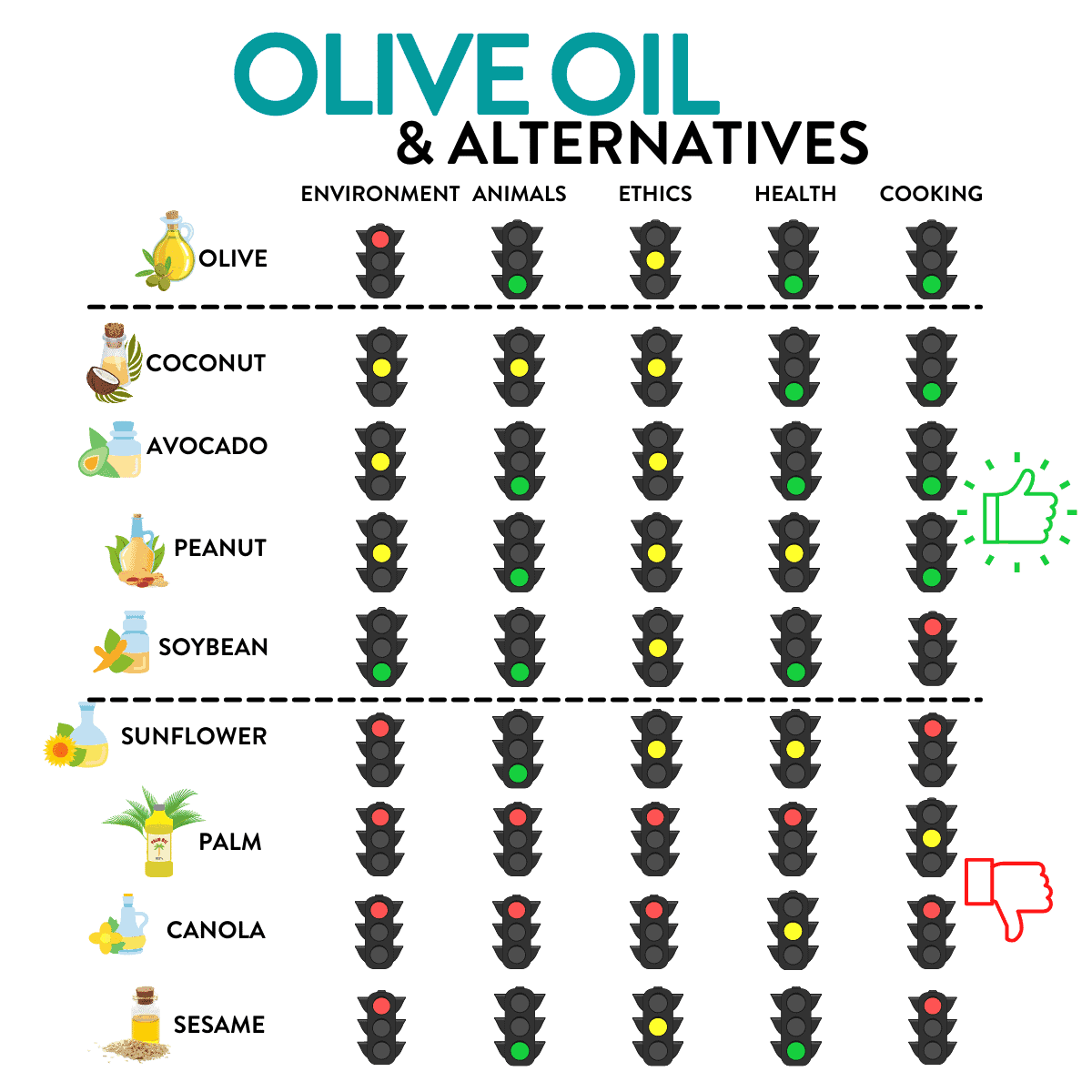Olive Oil is one of these ingredients used everywhere, from baking recipes to meals, from salads to burger sauce. Olive oil is also often used in vegan recipes to replace animal-based fat like butter.
Olive Oil is a plant-based product – it’s made with no animal-sourced ingredients. However, it’s not necessarily enough to make it vegan-friendly. Let’s find out why.

What Is Olive Oil?
Olive Oil is a liquid fat obtained by grinding olives into a paste that is then centrifugated to extract the oil. The finest oil is obtained from ripe olives. Green olives make bitter oil, overripe olives produce a cloudy oil with suspended particles.
Virgin Olive Oil is extracted using only mechanical means, without any chemicals.
Refined Olive Oil is obtained using a refining process that must keep its glyceridic structure. It’s often made using charcoal filters, and as a result, has less flavor than virgin olive oil.
Extra Virgin Olive Oil (EVOO) is a type of virgin olive oil with lower free acidity and superior taste.
Is Olive Oil Vegan?
Olive Oil is made from olives, sometimes using chemical products like charcoal but never using animal-based products.
Therefore, olive oil is a plant-based product. However, some vegans avoid consuming olive oil because of its environmental impact.
Environmental Impact Of Olive Oil Production
Olive oil product, in particular on the large scale necessary to maintain the supply, has a large environmental impact on our planet.
Land use and erosion
Most olive plantations are far from the picturesque local farmer growing a few trees and making a few hundred liters of oil a year.
Plantations cover hundred of hectares and are made exclusively of olive trees. In southern Europe and around the Mediterranean sea, where olive trees grow, the soil is relatively poor.
As a result, all other plants are removed to leave as much soil as possible to the olive trees that are also spread out quite a bit to maximize their yield.
Spreading, cutting other plants lead to accelerated erosion on very dry lands.
Water use
Olive trees use a lot of water, and they grow in places that experience frequent rainfall deficits.
It is estimated that about 14,7000 cubic meters of water have to be used for every ton of olive oil produced (source).
- Castor Oil: 24,700 m³ of water per ton
- Sesame Oil: 21,800 m³ of water per ton
- Olive Oil: 14,700 m³ of water per ton
- Linseed Oil: 9,400 m³ of water per ton
- Peanut Oil: 7,500 m³ of water per ton
- Sunflower Seed Oil: 6,800 m³ of water per ton
- Palm Oil: 5,000 m³ of water per ton
- Coconut Oil: 4,500 m³ of water per ton
- Rapeseed Oil: 4,300 m³ of water per ton
- Soybean Oil: 4,200 m³ of water per ton
So Olive Oil is one of the worst oils when considering its water footprint.
Emissions
Olive Oil also has a significant greenhouse gas emission footprint because of how it is produced (source).
- Olive Oil: 4.5 kg of equivalent CO2 per kg
- Sesame Oil: 4.2 kg of equivalent CO2 per kg
- Palm Oil: 3.3 kg of equivalent CO2 per kg
- Sunflower Oil: 3.3 kg of equivalent CO2 per kg
- Rapeseed Oil: 2.9 kg of equivalent CO2 per kg
- Coconut Oil: 2.1 kg of equivalent CO2 per kg
- Soybean Oil: 1.8 kg of equivalent CO2 per kg
- Peanut Oil: 0.9 kg of equivalent CO2 per kg
Olive Oil produces 4.5 kg of CO2-equivalent emission per kg of oil, twice as much as coconut oil and 5 times as much as peanut oil.
It is the worst of all dietary oils when looking at emissions alone.
Can I cook with Olive Oil?
Absolutely. Extra Virgin Olive Oil has a smoke point above 350°F (180°C), and Refined Olive Oil has a high smoke point, above 440°F (230°C).
These temperatures are above common cooking temperatures. Therefore, they are perfectly healthy when heated.
It’s a myth that olive oil becomes carcinogenic at normal cooking temperatures – even high temperatures.
Why does the smoke point matter for cooking oils?
The smoke point is the temperature at which an oil starts to smoke because it’s not heating up anymore, but it’s burning.
When oil burns, its components break down, releasing chemicals that can:
- Alter the taste of the food
- Be dangerous for your health
- Be poisonous
- Color the food
As a result, it’s critical to avoid heating oil to its smoke point.
The smoke point of common cooking fats ranges from 300°F (150°C) for butter to 520°F (270°C) for refining Avocado oil.
Note that any refined oil would have a smoke point much higher than its unrefined alternative due to the lack of impurities that tend to burn at lower temperatures.
Is Olive Oil Healthy?
Olive oil contains mostly monounsaturated fats (73%), which are seen the healthy fats as opposed to saturated fats (14%).
It’s also rich in omega-6 and omega-3.
Olive oil also contains vitamins, mostly Vitamin E and Vitamin K.
As a result, Extra Virgin Olive Oil is known to have many health benefits (source):
- Protection Against Inflammation
- Reducing Risk of Heart Disease
- Reducing Bad Cholesterol Levels
- Improving Blood Vessel Health
- Lowering Blood Pressure
What Are Olive Oil Alternatives?
There are many possible alternatives to olive oil if you choose to avoid it. There are many other oils that can enter your whole food vegan diet.
Coconut Oil
Coconut oil is another vegetable oil that is produced from coconuts.
Its health properties are somewhat similar to olive oil. You can also safely use it for cooking as well as no-bake recipes.
Coconut Oil also has a lower impact on the environment than Olive oil, with less water used and about half the emissions.
Peanut Oil
Peanut Oil is an oil that is suitable for cooking, has a much lower environmental impact than many other oils, and tastes very good.
It has the only issue of being made with peanuts and therefore can trigger allergies.
Avocado Oil
Refine Avocado Oil has a high smoke point (480°F, 250°C), making it resistant to oxidization. It’s full of healthy fatty acids and omega-6.
It uses close to 10 times less water than olive oil and has a low carbon footprint.
There are some ethical concerns with avocado production in certain regions of the world, in particular in South America.
Pick an avocado oil produced ethically and you have a great cooking and baking oil!
Olive Oil Alternatives to Avoid
Canola Oil (Rapeseed)
Rapeseed oil, also called Canola oil (for CANada Oil Low Acid), is a terrible oil. Its environmental impact is high, mostly because it’s a genetically engineered plant made to be resistant to roundup so that the crops can be covered in herbicide to increase yields.
It is also potentially dangerous for cooking, like many other seed oils. Seed oils are rich in polyunsaturated fats that oxidize when heated.
Palm Oil
Palm oil contributes to deforestation. It is harvested in highly unethical ways. It contributes to the endangerment of Orang Utans. And it’s not great for cooking.
Sunflower Oil
Sunflower Oil is another oil with a large environmental impact. Its emissions and water usage are still lower than olive oil, but they are nonetheless very high.
Unrefined sunflower oil is not great for cooking with a very low smoke point of 225°F (110°C), however, refined sunflower oil has a high smoke point 450°F (230°C).
Since it’s also a seed oil, sunflower oil is susceptible to heat damage well under the smoke point.
Sesame Oil
Sesame oil production consumes a huge quantity of water – even more than olive oil. It also has a comparable carbon footprint.
It has a medium smoke point, but since it’s made with seeds and it’s rich in polyunsaturated fats, sesame oil oxidizes fast when heated.
Conclusion
Though Olive Oil is 100% plant-based dietary oil, its consequent environmental impact pushes many people to avoid it and prefer other oils.
If you believe that veganism is also about reducing the impact of our food on the planet, then olive oil is not vegan.




Large areas of olive groves, as with any large plantation of trees, absorb a considerable amount of CO2. olive trees, absorbs 30 kg of CO2 per year, which makes the olive grove an important factor in curbing climate change’.